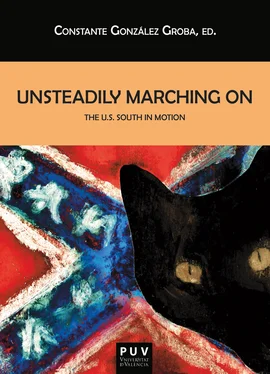1 ...8 9 10 12 13 14 ...21 Butler, Judith. Gender Trouble . London: Routledge, 2008.
Faulkner, William. Go Down, Moses . New York: Modern Library, 1970.
——. The Wild Palms . Harmondsworth: Penguin, 1982.
Ford, Richard. A Piece of My Heart . London: Harvill Press, 1996.
Gwynn, Frederick L., and Joseph L. Blotner, eds. Faulkner in the University: Class Conferences at the University of Virginia, 1957-1958. Charlottesville: UP of Virginia, 1977.
Hay, John. “Jim Bludso and the Prairie Belle.” Wondering minstrels blogspot. Posted June 24, 2003. Webpage http://wonderingminstrels.blogspot.com.es/2003/06/jim-bludso-of-prairie-belle-john-hay.html. Accessed 13 August 2011.
Newton, Philip. “Gender of rivers – and other waters.” October 2008. Webpage http://archives.conlang.info/thau/bhoersae/qenwiagal.html. Accessed 13 August 2011.
Polk, Noel. Children of the Dark House . Jackson: U of Mississippi P, 1996.
Smith, Lee. The Last Girls . Chapel Hill, NC: Algonquin Books, 2002.
Trilling, Lionel. “Huckleberry Finn.” In The Liberal Imagination: Essays on Literature and Society . Harmondsworth: Peregrine Books, 1970.
Twain, Mark. The Adventures of Huckleberry Finn . Harmondsworth: Penguin, 1971.
——. Life on the Mississippi . New York: Signet Classics, 1961.
Welty, Eudora. The Robber Bridegroom . New York: Athenium Books, 1963.
From Space to Self: Will Barrett’s Travels
in Walker Percy’s The Last Gentleman
Gérald Préher
The book is nothing but a journey.
(Walker Percy, in Lawson & Kramer 67)
In an interview, Walker Percy explained: “I am, as a novelist, concerned with the dislocation of man in the modern age, and I may well use a neurotic or psychotic man as a character who represents this dislocation, but note that it is an individual neurotic man” (Lawson & Kramer 11). Dislocation is indeed central in Percy’s fiction, as is manifest in his characters’ recurrent feeling that they are strangers in the world around them. Since they do not feel they belong anywhere, they tend to be on the move, either in time or space. The Last Gentleman ( LG ), Percy’s second published novel, is undoubtedly the best illustration of the writer’s statement. Describing the main protagonist in the novel, he writes: “Will Barrett […] is a curious young man beset by curious symptoms. He suffers a dislocation of his time sense which is manifested by attacks of amnesia and déjà vus ” (Percy, “Introduction” 54; my emphasis). Early in the narrative, the reader understands that Percy’s choice to have Will Barrett, a native southerner, live in New York is not made at random: “As everyone knows, New York is noted for the number and variety of groups with which one might associate, so that even a normal person sometimes feels dislocated. As a consequence this young man, dislocated to begin with, hardly knew who he was from one day to the next” ( LG 20; my emphasis). The question of identity is thus presented as a central trope and is intimately connected to the character’s search for the group he can belong to.
Will’s story has to do with the distinction Clément Rosset ( Fantasmagories 66) makes between reality (the here and now) and the real (a mixture of impressions, images and ghostly presences). In order to reach the sphere of reality, Will must make sense of the real he has created, for, as Rosset says, “the real is not on the side of the self but, rather, on the side of the ghost.” 1 Percy’s character first needs to understand the voices of the past if he is to step into the present. In Percy’s aesthetics, coming to terms with one’s identity, as shaped by past events, is a key to understanding one’s predicament. The Last Gentleman illustrates such a process for the structure of the narrative itself shows that Will Barrett is on a journey to selfhood. The first two chapters expose his growing awareness that a change is coming; his encounter with a family from the South in a hospital helps him accept the possibility of an adjustment as he understands that he will find the meaning of his existence in the South when he is invited to follow his fellow southerners home. From the third chapter onward, Will reunites with his native region and his past; he drops his mask and relocates his true self in an environment he knows intimately. Will’s travels are thus closely linked to his search for manhood; the telescope he uses at the beginning of the novel brings him closer to his real self and paves the way for the changes that the scene at the hospital and the character’s subsequent trips around the States will bring about.
Will’s life is defined as a “gap” ( LG 12) because of his recurrent memory lapses which, the reader understands, have to do with his repressing the memory of his father’s suicide. Such gaps would logically result in states of “selflessness” in which a person is alienated from himself and detached from the world outside—but this is not the case here. On the contrary, Will seems to be focused on using peripheral tools to read the world; the telescope is the most obvious one, his knowledge of psychoanalysis is another. His existence takes a new turn when he spots a telescope in a shop window and thinks that he has found what is missing in his life. As Jack Hicks argues, “he feels himself unable to touch reality, unable to participate in life, feels himself abstracted almost out of existence. And he seeks to correct that state by finding the right ‘key’” (164). Buying the telescope constitutes a pivotal moment in his quest since he soon finds out that the instrument “create[s] its own world in the brilliant theatre of its lenses” ( LG 5). This comment is particularly important for the narrative as it places the eye/I in the foreground. In Emersonian fashion, Will’s eye does become “the best of artists” (Emerson 31) and allows him to step into the real or what he believes to be real. His decision to buy a telescope is as essential as the instrument itself, as it creates the illusion that something is yet to be discovered when actually everything is already there: “it is the act of avoiding destiny that coincides with its completion,” as Clément Rosset asserts. 2 What the telescope enables Will to see is the ordinariness of the world around him, something he seems unable to realize without an intermediary.
In effect, the opening sequence of The Last Gentleman illustrates Rosset’s theory. Will is in the park, waiting for “the” peregrine falcon 3 to appear so that he can freeze it in time thanks to a camera “fitted to the telescope” ( LG 4); in other words, he is trying to force things. Though he fails to reach his goal, the telescope “[becomes] the instrument of a bit of accidental eavesdropping” ( LG 3). The choice of “eavesdropping,” an action associated with the ear and not the eye, is significant as it underlines Will’s coming to terms with his senses. 4 This episode is the starting-point of another search, which turns Will into an amateur detective, calling to mind Paul Auster’s Quinn in City of Glass whom Brian Jarvis defines as “simply lost in the city and to himself” (85). Intrigued by the behavior of a woman who leaves a note on the bench where she was sitting, Will decides to see for himself 5 what the message says, and, although there is apparently not much to it, to hide close by and see who the note is intended for. A beautiful young woman (Kitty) soon appears and, in what might seem like a parody of fairy tale, Will falls in love. Although the peregrine did not put in an appearance, the telescope undoubtedly directed Will’s attention to something unexpected. Lewis A. Lawson, in an illuminating essay on The Last Gentleman , has noted that “Will’s mental life is ‘layered’ like the mental life illustrated by Freud’s telescope [in chapter 7 of The Interpretation of Dreams ]. Will is , in a sense, the telescope that he uses...” (“Will Barrett” 18). Lawson’s comment helps understand the novel as an inquiry into the psyche of a singular character; it also highlights the way space and self intertwine throughout the narrative.
Читать дальше












